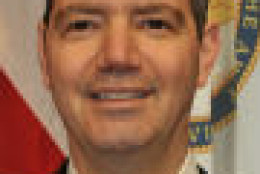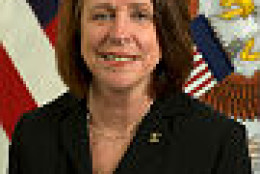Army
-
Army scientists and engineers are advancing sensors research in hopes of giving future soldiers enhanced situational awareness. Soldiers of 2025 and beyond may wear sensors to help detect and prevent threats like dehydration or elevated blood pressure. Dr. Donald Reago is the director of the Night Vision and Electronic Sensors Directorate at Fort Belvoir, Virginia. He joined Tom Temin on the Federal Drive with more on the possibilities.
January 22, 2015 -
The new year will bring new contracting initiatives throughout government. A big case in point: The Army's forthcoming Responsive Strategic Sourcing for Services, or RS3. It's one of several big, multiple-award contracts that will drive consolidation of professional services. Many more service contracts are likely to flow through vehicles like RS3 and the Navy's SeaPort E. Kevin Brancato, Senior Defense Analyst at Bloomberg Government, joined Tom Temin on the Federal Drive to provide a broader outlook on RS3 and defense contracting in 2015.
January 02, 2015 -
Wednesday is the five-year anniversary of the Army Corps of Engineers Veterans Curation Program. The program gives veterans a chance to learn new skills that will help them transition to civilian jobs. Jo-Ellen Darcy is assistant secretary of the Army for Civil Works. On In Depth with Francis Rose, she explained how the program started, and why they're celebrating.
December 01, 2014 -
Former Army CIO Susan Lawrence discusses the challenges her agency faces in modernizing its network systems and the future of women in the service.
November 26, 2014 -
The Defense Department has professed a belief in open systems architectures for years, but has had trouble translating its stated policy preferences into acquisition outcomes. A program to modernize the military's helicopters aims to change that
November 26, 2014 -
Janet Hill, principal at Hill Family Advisors, sits down with the Women of Washington radio show to discuss the importance of diversity in American corporations and her famous Wellesley classmate - Hillary Clinton.
November 19, 2014 -
The pace of new Ebola infections appears to have leveled off, but its too early declare victory. A lot of work is going on behind the scenes, on the research front. Army scientists are working on a vaccine for Ebola. With troops being deployed to West Africa to help control and treat the outbreak, Army scientists are taking the most advanced vaccines forward as quickly as possible. Dr. John Dye is the viral immunology branch chief at the U.S. Army Medical Research Institute of Infectious Diseases. He tells Tom Temin on the Federal Drive that for the Army, research into infectious diseases has a long history.
November 17, 2014 -
Leaders at the Army Corps of Engineers say the effects of climate change mean its vast network of civil works projects is going to have to contend with weather events that are more severe — and most importantly — less predictable. As Federal News Radio DoD Reporter Jared Serbu reports, the Corps is changing its planning process to account for that uncertainty, and it's about much more than building higher and stronger dams and levees.
November 13, 2014 -
Mike Krieger, the former Army deputy CIO/G6, retired after 35 years in government. He says the move to email-as-a-service in the cloud provided the Army the roadmap to change how it looks at shared services.
November 13, 2014 -
Former Army CIO Susan Lawrence discusses the challenges her agency faces in modernizing its network systems and the future of women in the service.
November 12, 2014 -
Prodded by an earlier pilot project with the Joint Staff, the Army is moving aggressively to replace thousands of desktop computers at the Pentagon with zero client hardware. The project should be completed by the end of 2015.
November 12, 2014 -
It may seem like a leap to go from Army sniper to a career helping federal agencies deliver great online customer service and software development practices. But that's the story of Randy Tharp. A wounded warrior of two tours of duty in Iraq, he's also had two tours of duty as a federal civilian employee before heading to the Five-Nine Group.
November 11, 2014 -
It may seem like a leap to go from Army sniper to a career helping federal agencies deliver great online customer service and software development practices. But that's the story of Randy Tharp. He's a wounded warrior of two tours of duty in Iraq, and he's also had two tours of duty as a federal civilian employee before heading to the Five 9 Group. Tom Temin spoke to Tharp on the Federal Drive.
November 11, 2014 -
On this week's On DoD, some thoughts on the Army drawdown from the Army's chief personnel officer.
November 05, 2014 -
The Pentagon has professed for years that that open architectures were a great idea. Shrinking budgets might make them the default option.
November 05, 2014








